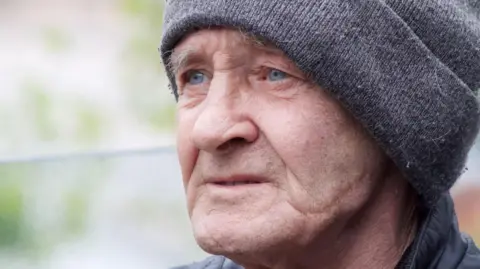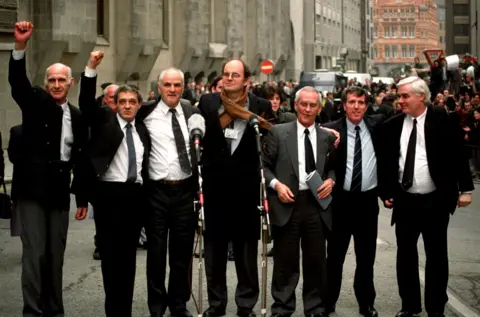Paddy Hill - a man who was horribly wronged
 BBC
BBCPaddy Hill, one of six men wrongly convicted and imprisoned over the 1974 Birmingham pub bombings, died aged 80 on Monday.
I wasn't born when the Birmingham pub bombings happened in 1974 but one of my earliest news memories is from 1991, watching the Birmingham Six being released after 16 years for a crime they didn't commit. I have a recollection of my parents explaining what had happened and of a very angry man shouting into a microphone.
That man was Paddy Hill, in a clip that has been broadcast many times since.
He said: "The police told us from the start they knew we hadn't done it! … Justice? I don't think them people in [court] have got the intelligence to spell the word, let alone dispense it!"
Little did I know that many years later I'd get to know him, first when making the BBC TV documentary Birmingham Irish I Am in 2019, and again, in a sense, when making the podcast In Detail …The Pub Bombings in 2024.
 Sean Dempsey/PA Images
Sean Dempsey/PA ImagesI say "in a sense" because I didn't interview him specifically for the podcast.
I tried to, but throughout 2024 his health was already failing and it wasn't something he wanted to do. He'd never been short of a word to say about the pub bombings – and in recent years he had been an active campaigner on behalf of the Justice For the 21 campaign – but it seemed that finally, after 50 years, it was all too much, even for him.
It was a shame not to see him again and there were obviously other questions I'd have asked him - yet despite this I feel I got to know him better than ever. I went back through my interview notes and recordings and I re-watched all the footage that I and others around the BBC had of him – all the clips you hear from him in the podcast series are from my original interviews.
What jumped out consistently was a man horribly wronged, who sadly never came to terms with the hand he'd been dealt. One psychiatrist apparently concluded that Paddy was one of the most traumatised people he'd ever met.

I remember when we were filming with him in Birmingham in 2019 and we broke for lunch. The crew were tucking in but Paddy didn't want anything to eat - we tried to persuade him to have something, but he explained he only ate late at night. This was a habit he'd developed in prison when, because of always watching over his shoulder, he'd take food back to his cell and only eat then. This was nearly 30 years after he'd been released.
I'll also never forget the anger that burned behind his eyes when the subject of the wrongful convictions came up. There was particular ire for the scientist responsible for the botched forensic tests, which suggested wrongly that Paddy and one other man had recently handled explosives.
I'm pleased to say I got to see another side of Paddy as well though. When we filmed him for the TV documentary, I was keen to hear what his life in Birmingham was like when he first came to the city.
He was one of thousands of Irish people who'd arrived to look for work and opportunities, but he'd never really spoken about that. Why would he, when people only ever really asked him about the bombings and his imprisonment?
The presenter of the programme, Dr Angela Moran, was able to steer him on to all sorts of subjects. He recalled perfectly the pubs on Stratford Road they used to go to: "You had the Bear, The Bull, the Shakespeare was on the corner."
He also recalled the singalongs and punch-ups they'd have back in the day between the country folk from Ireland and the city folk from Dublin and Belfast. "It was terrific," he cheerfully concluded. Angela and Paddy even had an impromptu singalong of the song When You Were Sweet Sixteen.
It's these more relaxed moments that first come to me when I think of Paddy but, if you look at all the comments on social media or under other articles, you can see how many people he must have helped over the years and the amount of lives he touched. He set up the Miscarriages of Justice Organisation to support others wrongfully imprisoned and who knows how many people benefited from that.
I can only hope this helped Paddy find some degree of comfort, because I don't think he ever got over what he'd gone through for all those years and the impact on his family.
Follow BBC Birmingham on BBC Sounds, Facebook, X and Instagram.
